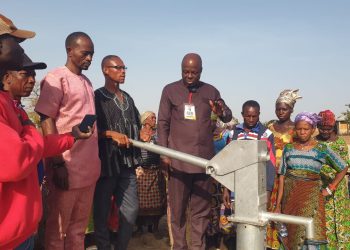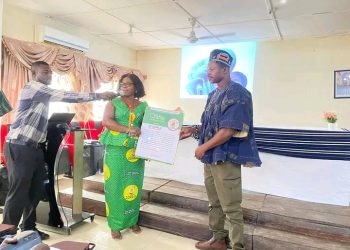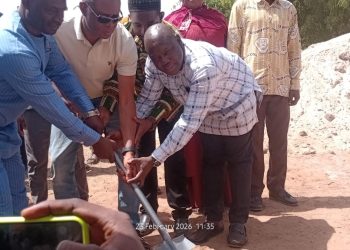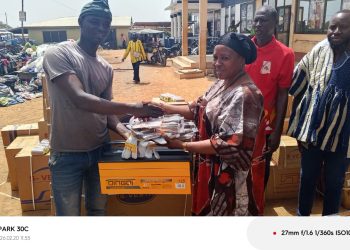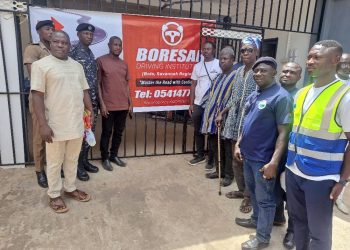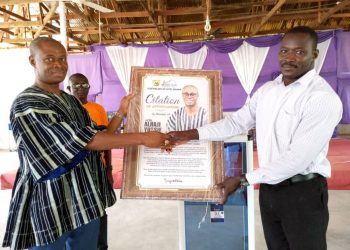
Inthe remote Ghanaian village of Pinvuro, dreams are fragile things, easily lost to poverty, powerlessness, or the sheer weight of obscurity.
But Dari, a boy with a heart full of purpose and a mind sharpened by adversity, dares to hope beyond the horizon.
From studying under kerosene lamps to battling a broken admissions system, A Dream Beyond the Map follows his journey through rejection, reinvention, and resilience.
When connections matter more than competence, and merit bows to nepotism, Dari fights not with favors but with fierce determination.
His story unfolds through school corridors, village classrooms, and dusty health outreaches, until a moment of impact catches the attention of the world beyond his forgotten corner.
More than a story as the boy rises, this is a testimony to the power of perseverance in a system designed to ignore it.
A Dream Beyond the Map is for anyone who’s ever felt unseen, unheard, or underestimated and still chose to rise.
The IntroductionBatulor Dari was born in the quiet village of Pinvuro, tucked away in the Sawla-Tuna-Kalba district of the Savannah Region in Ghana.
Life in Pinvuro moved slowly, untouched by the noise and glitter of city life.
Here, people rose with the sun, farmed the land, and counted their blessings in rainfall and harvests.
Yet even in this small, remote place, dreams could grow.
From an early age, Batulor Dari was different. While other boys chased goats or played football in the dust, Dari devoured every book he could find.
His teachers often said he was too curious for a village child. He dreamed of becoming a doctor, not just to wear the white coat, but to heal, to help, and to matter.
He had seen too many people die needlessly, his own younger sister among them, because the nearest clinic was days away.In school, he was always first in class. But excellence wasn’t enough.
He watched how other brilliant students before him faded into the background of village life.
They were told to be realistic. In Ghana, you had to know someone, an MP, a director, or a family friend in a big office.
Without any connection, your dreams remained just that.Still, he studied by kerosene lanterns, borrowed books from traveling passengers, and listened intently to the radio.
He imagined one day hearing his name on it, not as a casualty, but as a contributor to the nation’s development.The older Dari grew, the more he understood the weight of society’s invisible walls.
People around him praised his academic success, but they rarely believed it would lead to anything tangible. Even his father, a humble farmer, would warn, “Dari, your books are good, but life is not written on paper.”His mother, Kontomo, was quieter but more encouraging.
She was the one who smuggled extra tomatoes into his lunch when food was short. The one who waited by the roadside for hours when he returned home from school holidays. She never said much, but her eyes said, “Don’t stop.”Dari ‘s dreams were not naive.
He understood that brilliance alone was not a currency in a nation where doors opened not by keys but by names.
And so, he made a vow at the age of thirteen, under the old baobab tree by the village stream. “Even if I must crawl, even if no one calls my name, I will go beyond this map.”The map, to him, was not just paper or place; it was the invisible boundary drawn around him by birth and circumstance.
Who You Know When Dari finally secured admission to a senior high school in Damongo, it felt like crossing a border into a different world.
The town was bigger, louder, and buzzing with possibilities he had never seen in Pinvuro.
It was here he encountered the subtle caste system that dictated one’s fate in Ghana: not by talent, but by ties.
His new school was filled with the sons and daughters of the elite business moguls, doctors, lawyers, political figures, civil servants, and the list continued.
Dari, despite his impeccable grades and genuine ambition, began to feel invisible.
He realized that for many of his peers, school was just a formality; their paths had already been paved with favors, promises, and powerful names.
He studied relentlessly. He participated in debates, represented the school in science competitions, and consistently topped his class.
Teachers admired him.
But when the university application season arrived, he saw how deep the problem ran. Friends with poorer results casually dropped names: “My uncle is on the admissions board” or “My mother knows the dean.” But Dari had no names.
Just results.Each rejection letter was a blade. Not because he wasn’t qualified, but because he was alone.
As others celebrated their placements into medicine, law, or political science, Dari sat silently in his room at the student hostel, rereading his rejection emails, his knuckles clenched in disbelief.
He started applying to lesser-known institutions. Some replied with vague waiting list promises. Others simply never wrote back.
It was then Dari began to truly understand the glass ceiling built over people like him.
You could see the sky, but you could never reach it unless someone lifted you through.
When he returned to Pinvuro after graduation, the villagers welcomed him like a hero. “The scholar has come,” they said. “Our pride.” But he felt none of it.
Inside, he carried the weight of frustration.
Of being stuck.One day, an old man from the village, Mr. Sowietey, called him over. “I know what you’re feeling,” he said, tapping his walking stick on the ground. “You have every right to be angry. But anger will not carve your path. Start where you are. Use what you have.”Dari nodded, uncertain. But those words planted a new kind of seed.
That night, he walked to the tree where he used to study under the stars. He looked up, fists clenched. “They won’t make it easy,” he whispered. “But I’ll make it anyway.”He would find a way. Not through shortcuts or name drops, but through resilience.
The Side Paths Batulor Dari began teaching in a basic school in a nearby town. It wasn’t the university lab or the white hospital corridors he had envisioned, but it was a beginning.
He poured himself into the job, using science classes as opportunities to open his students’ minds. Often, he’d stay after school, tutoring those who struggled and challenging the brightest.
He also saved every pesewa he could. It wasn’t much; teachers in rural Ghana barely scraped by, but Dari had a plan: he would apply again to university, this time with more strategy and, hopefully, some luck.
Each evening, after teaching and working in his small backyard garden, he would sit under the moonlight, studying for entrance exams again.
His application essays were handwritten.
When he finally received an offer from the University for Development Studies in Tamale to study biology, he cried.
Not from joy alone, but from the exhaustion of the climb.The village erupted in celebration. Drums, singing, food. The boy from Pinvuro was going to be a scientist.
At UDS, Dari was back among giants, brilliant minds, and well-connected peers.
But he was more focused than ever. He volunteered for research programs, joined student groups, and worked part-time cleaning offices at night to survive.
Even after graduating with honors, the war wasn’t over. Job hunting in Ghana was another beast. His classmates with connections found internships and postings almost immediately. Dari sent CV after CV. He visited offices and met secretaries who told him, “You’ll hear from us.” Which he never did.
At one point, he almost gave up.
Depression began to cast its long shadow. But then he remembered that old tree in Pinvuro and the dream.
Dari decided to start a health outreach program in northern villages, using what little savings he had.
He gathered fellow unemployed graduates, partnered with a local church, and began organizing basic health screenings, education sessions, and first aid trainings.
The project caught the attention of a visiting NGO.One day, while he was demonstrating how to purify water using basic materials, a foreign doctor watched in silence.
Afterward, the doctor approached him. “Who trained you?” he asked.Dari smiled.
“The dream did.”Seeds That BloomThe outreach program had started as a desperate attempt to stay afloat emotionally and professionally, but it was quickly becoming something more.
Dari and his small team, made up of fellow graduates who, like him, had talent but no godfathers in the cities, turned every outreach trip into a statement: “We are here.
We matter, and we will serve.”They journeyed to forgotten villages such as Taari, Tourtein, Saar, Gbaaltein, Damitein, and other neighboring places that had never seen a doctor.
They brought soap, bandages, water treatment tablets, and knowledge.
Sometimes they had to borrow a friend’s motorbike, and sometimes they walked miles under the sun, their kits carried in worn-out backpacks.
The word spread like a preaching gospel!What began with a few people under a tree in one village turned into dozens gathering in open fields, and eventually, local chiefs began calling him. “Dari,” they would say, “come to our town next. Our children cough all the time.
Maybe you can help.”Each outreach became a classroom, and each classroom planted seeds not just in the villagers but in Dari himself.
And still, every night, he’d lie awake with questions.“How long can I keep this up?” “Will this ever be enough to survive?” “Will I always be just a volunteer?”But the fire that burned inside him would not let him stop.
One afternoon, during an outreach in a community called Kporiju, he was approached by an elderly woman who handed him a basket of yams, eyes filled with tears. “My daughter’s fever has gone,” she said. “No one ever came until you.”Dari had no money for transportation that day, so he tied the yams in a cloth and carried them back with pride.
That night, eating boiled yam with nothing but salt, he felt like a king.The NGO that had spotted him in Saar didn’t forget.
A month after that chance encounter, he received an email. They were looking for a local program coordinator for a community health initiative across three districts.
They wanted someone who knew the land, the language, and the people.
His heart pounded as he read the message over and over.This wasn’t a job through an uncle. It wasn’t a favor from a politician. It was merit.He interviewed nervously but honestly and got the position.Now, with a modest salary and the backing of an international partner, he scaled up. He registered the outreach as a nonprofit.
He trained more volunteers. He set up a reporting system, began data collection, and applied for small grants.Journalists began to notice.”The Doctor Without a Degree,” one headline called him. “The Hero of the North,” said another.
But to Dari, it was never about titles.
It was about impact.And so, when he was invited to speak at a health conference in Accra, he wore his old, patched-up shoes and stood before suits and ties with a voice that shook the room.“I come from a village where dreams die quietly,” he said.
“But I’m here to say some seeds bloom late. Give them sunlight, give them water, and they will rise.”He received a standing ovation.After that conference, a professor from the University of Ghana walked up to him and said, “Young man, have you considered doing your master’s? I can recommend you.”Dari smiled.
He didn’t know that man. But the work did.The dream was no longer a map.
It was now the land itself, rising, living, and breathing.
The Path of Persistence Dari had always known that the journey to realizing his dreams would not be an easy one, but nothing could have prepared him for the battle that lay ahead after his acceptance into the University of Ghana to pursue a master’s degree in public health program.
For someone who had grown up in the remote village of Pinvuro, every step he took towards the city felt like he was walking into an entirely different world.
The University of Ghana located in Accra, is a city brimming with ambition, opportunity, and competition.
Dari marvelled at the modern buildings, the vibrant campus, and the sea of students, all with their own dreams and aspirations.
To him, it was surreal to even be walking the same grounds as the children of politicians, business moguls, and influential figures.
These were the same people who had secured internships and job offers long before they graduated, simply by virtue of who they knew.Dari’s first days on campus were filled with wonder, but soon, the reality of his position as an outsider settled in.
Though he had earned his place in the program through merit, he often felt like an imposter among his more privileged peers.
While others effortlessly talked about family vacations abroad or internships with top-tier companies, Dari could only nod quietly, focusing on the lessons at hand.
His classmates could afford private tutors and had established networks through their powerful families, something Dari could never dream of.
To them, university life was merely a stepping stone to a future secured by their family names.
Despite the disparity, Dari was determined to make the most of his opportunity.
His old habits from Pinvuro kicked in.
He studied late into the night, skipping social gatherings and extracurricular events to bury himself in textbooks.
He found solace in the campus library, where he would read for hours, researching public health practices that could later help improve life in rural Ghana.
But even in the library, Dari faced another obstacle: time. Unlike his classmates, he couldn’t afford to study without working.
In the evenings, after classes, he took on various part-time jobs.
He worked as a cleaner in the lecture halls and carried concrete for masons outside campus, a job he was embarrassed to talk about but one that was necessary to cover his expenses.
Every night, after cleaning the halls, he would return to his hall called Commonwealth, take a quick shower, and get back to studying.At first, it was hard.
The exhaustion weighed on him, and there were nights when he wanted to give up.
It seemed as though the doors to success were always slightly out of his reach.
But then, he remembered the promise he had made to himself when he was just a child studying under the stars in Pinvuro: “I will go beyond this map.”That promise kept him going.
He refused to let his circumstances define him. He had seen many others fall by the wayside, despite their intelligence and hard work, simply because they didn’t know the right people.
But Dari knew that if he kept pushing, kept proving himself, there had to be a way forward.After months of sleepless nights and hard work, Dari received a call that would change everything.
The professor who had initially helped him get accepted into the program, one of the few who had seen his potential, reached out with an offer.”Dari, I have some good news,” the professor said. “We are opening a public health research grant. We would like to offer you the opportunity to apply. It’s a competitive program, but you have the credentials and the heart to make a real impact.”Dari was stunned.
Not only was the research grant a huge professional opportunity, but it was also a sign that someone, somewhere, had seen his determination and his value. He thanked the professor and, with renewed energy, set to work on the application.
The Land of Opportunity Dari’s acceptance into the public health program at the University of Ghana had been a monumental achievement, but now the real battle began.
University life in Accra, as grand and exciting as it was, only made Dari feel more isolated. It wasn’t just the physical distance from Pinvuro that set him apart from his peers; it was the emotional divide that came with not having the same privileges.
His classmates had grown up surrounded by people who could open doors for them, people who knew the right people.
For Dari, success would depend on his merit alone.The days were long. After his grueling hours at school, he continued working to pay his bills.
Cleaning lecture halls, carrying concrete, tutoring colleague students in exchange for some extra cash—everything was part of the hustle. Each day, Dari woke up before dawn at the 24-hour library to shower before the 7:30 am lectures began.
He studied during breaks, when his classmates took naps or hung out at the campus restaurants.
But even as he worked tirelessly, Dari noticed something.
His peers, who had influential family members in positions of power, found it easy to get jobs.
They would come back to campus with stories of internships at major hospitals, government positions, and international organizations.
Their lives seemed set, their futures secured. They had connections; Dari had only his resume and his passion.
As months wore on, he finally graduated with distinction.
Dari found himself applying for positions, sending out CVs, and attending interviews, only to receive polite but firm rejection letters. He met with employers who told him they would “get back to him,” but those words never came to fruition.
Once again, it felt like the doors were being slammed in his face. He began to feel defeated, questioning whether all of his hard work had been worth it.
After completion, Dari was still perching on campus since there is no place to rely on. One night, while walking back to his hall after another disappointing day, Dari ran into a former professor who had always been an advocate for him.
The professor noticed the look of exhaustion and frustration on his face and asked what was wrong.”Professor, it feels like I’m invisible,” Dari admitted, his voice thick with frustration.
“No matter how hard I try, it’s like I don’t belong here. I don’t have the connections. I’m not from a wealthy family. I’m just… a village boy trying to survive in a world that doesn’t care.”The professor looked at Dari thoughtfully and then placed a reassuring hand on his shoulder. “Dari, you have something far more valuable than connections; you have the will to make a difference.
Your journey is not an easy one, but it’s one worth taking. Keep pushing, keep striving. Don’t give up.”The professor’s words stuck with Dari as he walked back to his hall that night.
Despite the constant rejections, despite the loneliness, he knew that giving up wasn’t an option.
He had come too far. He had fought too hard to let his dreams slip away.Instead of sinking deeper into despair, Dari decided to create his own opportunities.
He began networking with local NGOs that were dedicated to improving healthcare in rural areas.
He knew the needs of the people in the northern regions of Ghana better than anyone else.
He used his knowledge of local communities to set up health workshops and outreach programs in villages that had never seen a doctor.
His first project was small, but the impact it made was undeniable.
Dari partnered with local churches and NGOs and recruited fellow graduates with whom he shared his vision.
Dari revamped his outreach programs. He organized health screenings, sanitation workshops, and first aid training.
The people of the villages were amazed. They had never experienced such care and attention. Word began to spread about Dari’s outreach programs like a preaching gospel, and soon, local chiefs began calling him, asking him to come to their villages.
Dari’s work eventually caught the attention of a foreign NGO that was looking for someone to lead a community health initiative across three northern regions.
They had heard about his program and were impressed with his hands-on experience.One day, Dari received an email from the NGO, offering him a position as the program coordinator.
It wasn’t the glamorous job he had once dreamed of, but it was a job with purpose.
It was a job that allowed him to work in the field, to help the people he had always wanted to help.Dari smiled as he read the offer.
For the first time in a long while, he felt like he was on the right path.
The road had been long and winding, but he had finally found a way to make a real difference.
Beyond the Map Dari stood at the podium in front of the gathered crowd at the National Health Conference in Accra.
The room was filled with people dressed in sharp suits, with polished shoes that clicked against the floor as they moved.
Government officials, philanthropists, and experts from all over the world had gathered to discuss the future of healthcare in Ghana.
The lights were bright, and the air was thick with anticipation. But Dari wasn’t nervous.In fact, he had never felt more at home.The conference was a culmination of years of work.
From the days of sitting on the dusty ground in the village of Pinvuro, studying under a baobab tree, to the long nights spent cleaning lecture halls at the University of Ghana, to the years of relentless rejections, Dari had finally made it. His journey had been hard, filled with obstacles and hardships that many would never fully understand.
[5/22, 9:10 AM] CHIPO KWAKU: Yet, here he was, standing in front of a room full of decision-makers, about to speak not as a “village boy” but as someone who had built a movement that was changing the landscape of healthcare in rural Ghana.
Dari cleared his throat and looked out over the room. His eyes swept across the sea of faces, many of which he recognized from his outreach programs. He had worked with them, side by side, in the villages where healthcare was nothing more than a distant dream.
And now, they were here too, dressed in their finest clothes, standing alongside the very people who had dismissed their efforts just a few years ago.“I come from a village where dreams die quietly,” Dari began, his voice steady but carrying the weight of years of sacrifice.
“A village where the map ends, and the journey feels impossible. But I am here today to say that it’s not the map that defines us. It’s the will to push beyond it. To go beyond the boundaries that others set for us.”His words echoed in the room, and for a moment, everything felt still. He could feel the eyes of the audience on him, but instead of feeling overwhelmed, he felt a deep sense of peace.
This was his moment, not to brag about his success, but to inspire others to believe that no matter how impossible the road may seem, there is always a way forward.Dari shared his journey, the struggles, the setbacks, and the small victories that had led him to this point.
He spoke about the health outreach programs he had started in the northern regions of Ghana, the impact they had on communities that had never seen a doctor, and the lives they had saved with just basic healthcare knowledge. He spoke about his fellow colleagues who had become health workers themselves, inspired by his example.But it wasn’t the statistics or the success stories that moved the audience.
It was the authenticity in his voice, the passion that burned in his words. This was a man who had built something from nothing, not for personal gain, but because he understood that a single life saved could be the key to unlocking a better future for an entire community.“As a country,” Dari said, “we have always believed that success comes from the connections we have, the families we belong to, and the names we carry.
But I stand here to tell you that true success comes from the work we put in, the lives we touch, and the love we share. Success is not defined by your last name, but by the difference you make in the world.”The room fell silent for a moment, and then, as if on cue, the applause began. At first, it was hesitant; perhaps people were still processing his words, but it quickly grew into a powerful standing ovation. Dari’s heart swelled with gratitude.
This wasn’t just a moment of personal triumph; this was a moment for all the people he had met along the way. The villagers, the young graduates, the health workers, and the children whose lives had been changed by his outreach—this was their victory too.After the applause subsided, a professor from the University of Ghana, the same one who had encouraged him during his lowest moments, approached Dari.
He looked at him with pride, his eyes filled with respect.“Dari,” the professor said, “you have done something that few people ever achieve. You’ve taken the path less traveled, and in doing so, you’ve paved the way for others to follow. Your journey has inspired so many of us here today.”Dari smiled, his thoughts drifting back to the long days in Pinvuro, to the nights when he wasn’t sure if he would ever make it.
To the countless rejections, the sleepless nights, and the moments when it felt like giving up was the only option.“I didn’t do it alone,” he said, his voice full of humility. “I had people who believed in me, even when I couldn’t believe in myself. And I had a dream. A dream to go beyond the map.”Later that evening, Dari sat outside the conference hall, watching the city lights twinkle in the distance. For a brief moment, he closed his eyes and took a deep breath. This was it.
This was the moment he had worked for, the moment when everything came together. It wasn’t about the accolades or the recognition; it was about knowing that he had stayed true to himself, that he had never given up on the dream he had nurtured since childhood.The next day, Dari received a call from an international health organization, offering him a high-level position to lead a major health initiative across several African countries.
It was the kind of opportunity most people could only dream of. But as he sat there, listening to the offer, Dari knew one thing for sure: this was not the end.His journey was just beginning.In the years that followed, Dari’s impact continued to grow. He expanded his outreach programs, built schools in rural areas, and mentored countless young people who, like him, had big dreams but no connections.
He was no longer just a “village boy” trying to survive. He had become a symbol of hope and resilience for all those who had been told their dreams were impossible.As he looked back on his life, Dari realized that the map had never truly defined him.
It had only been a tool to help him navigate the world. The real journey was the one he had taken with his heart and his determination.
And now, standing on the cusp of something even greater, he knew that he was ready for whatever came next.Because, after all, the map was just a starting point. It was the journey beyond the map that truly mattered.The end of the story.
By Belsitey Jorbin Daniel.

